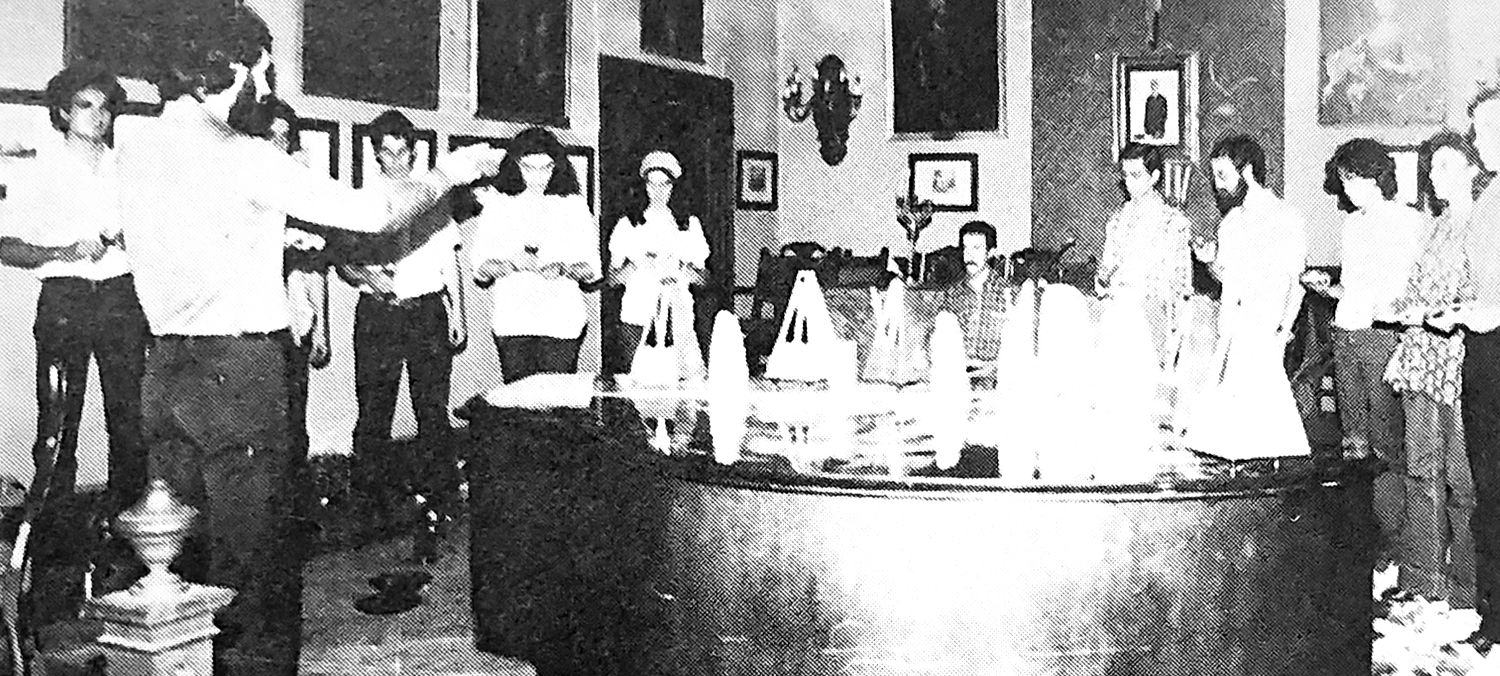Carmen Pardo, Henar Rivière and Arnau Horta
Talks
02.10.2020
Friday 2 October, 5-8 pm
Courtyard of the Palau de la Virreina.
Free.
Limited capacity with prior registration.
The doors will open 20 minutes before the start of the session.
REGISTRATION ->
5 pm LESSONS OF DUST AND SILENCE
Talk by Carmen Pardo
Exploring the origins of action music, we come across landscapes of dust inhabited by silences. In these landscapes, the contours are blurred, as in Élevage de poussière by Marchel Duchamp and Man Ray (1920), and the concepts are disrupted. The landscapes of dust and silence are not in fact landscapes, but gestures in which the actions are developed by Dada, Zen Buddhism and Antonin Artaud’s theatre. To approach these gestures, we will locate ourselves in 1952 accompanied by 4’33’’ by John Cage and Untitled Event by Cage and Merce Cunningham. With them we will remember that an experimental action is often, like life, covered by a fine drizzle of dust and silence.
6 pm OVERFLOWS AND CONVERGENCES. THE ORIGINS OF ACTION MUSIC IN FLUXUS AND ZAJ
Talk by Henar Rivière
Fluxus and Zaj are the names of two vaguely defined concretions of artistic experimentation that emerged in the late 1950s and gave shape to the new practices that ran through the 1960s and 1970s, transforming the international art scene radically and definitively. Performance art, conceptual art and postal art networks were forged within Zaj and Fluxus through a work that emphasized action, going beyond the limits of traditional artistic disciplines to converge in a conception of music as “a search for a language that is not exclusively expressed in sound”, in the words of the Zaj artist Juan Hidalgo.
7 pm ACTION MUSIC AND SOUND PRACTICE IN THE EXPANDED FIELD
Talk by Arnau Horta
Starting from various examples, this talk will examine the meaning and various forms of expression of action music, a rather diffuse category that, like so many others, includes an extraordinary plurality of sound practices. To this end, we will use some scholarly concepts such as “sound practice in the expanded field”, “non-cochlear sonic art” (Kim-Cohen) and “non-fiction music” (Jennie Gottschalk). The aim of the session is to present action music as one more region of what has been called sonic art—undoubtedly the widest, most ambiguous and most arbitrary category of all.
Carmen Pardo Salgado (Barcelona, 1963) is a senior professor at the University of Girona. She was a post-doctoral researcher at the Institute for Research and Coordination in Acoustics of the French National Centre for Scientific Research in Paris (1996-1998; 2018). She took charge of the editing and translation of John Cage, Escritos al oído (John Cage, Writings to the Ear, 1999). She is the author of Música y Pensamiento. Apuntes de un encuentro (Music and Thought. Notes on an Encounter, Universidad de Jaén, 2020), En el silencio de la cultura (In the Silence of Culture, Sexto Piso, 2016/Eterotopia France, 2018), La escucha oblicua: una invitación a John Cage (The Oblique Listening: An Invitation to John Cage, Sexto Piso, 2014/L’Harmattan, 2007), which was awarded the Coup de Cœur in 2008 by the Académie Charles Cross), Las TIC: una reflexión filosófica (ITC, A Philosophical Reflection, Laertes, 2009) and Robert Wilson (with Miguel Morey, Polígrafa, 2003).
Henar Rivière (Madrid, 1980) has a PhD in art history and is a Project and Research Coordinator at the Lafuente Archive in Santander. She has been a researcher and teacher at the University of Castilla-La Mancha in Cuenca and the Universidad Complutense de Madrid and has received research grants in Los Angeles (Getty Research Institute) and Berlin (Freie Universität). She specializes in the origins of action art and intermedia, with special emphasis on Fluxus, Zaj and the new artistic practices that paved the way for performance art, conceptual art, sound art and postal art networks. As an independent curator, she has organized exhibitions such as FLUXUS ABC (Krinzinger Gallery, Vienna) and TLALAATALA. José Luís Castillejo and Modern Writing (MUSAC, León and CAAC, Seville).
Arnau Horta (Barcelona, 1977) is an independent art curator, critic, researcher and teacher. Both in his curatorial activity and in his work in the field of research and dissemination, he deals mainly with the analysis of the phenomenological and political dimensions of sound and listening. He is currently studying for a doctorate in philosophy at the Universitat Autònoma de Barcelona. He has carried out various projects for the Museo Nacional Centro de Arte Reina Sofía (MNCARS), the MACBA, the Fundació Joan Miró, the Centre de Cultura Contemporània de Barcelona (CCCB), Sónar, the Max Planck Institute in Berlin, the Loop video art festival and Foment de les Arts i del Disseny, among other cultural centres and initiatives. He is a contributor to the cultural supplements Cultura/s (La Vanguardia) and Babelia (El País), where he writes about contemporary art, thought and culture.











